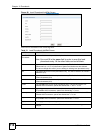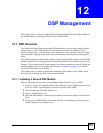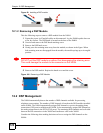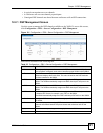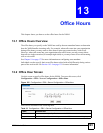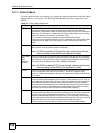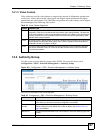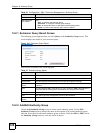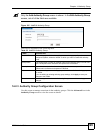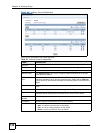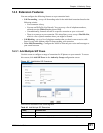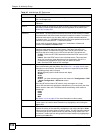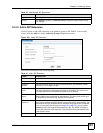
Chapter 14 Authority Group
X6004 User’s Guide
126
14.1.1 Voice Codecs
A codec (coder/decoder) codes analog voice signals into digital signals and decodes the digital
signals back into voice signals. The following table describes the codecs supported on the
X6004
Table 34 Voice Codecs Supported
CODEC DESCRIPTION
G.711 This is a Pulse Code Modulation (PCM) waveform codec. PCM measures analog signal
amplitudes at regular time intervals (sampling) and converts them into digital bits
(quantization). Quantization "reads" the analog signal and then "writes" it to the nearest
digital value. For this reason, a digital sample is usually slightly different from its analog
original (this difference is known as "quantization noise").
G.711 provides excellent sound quality but requires 64kbps of bandwidth.
There are two main algorithms defined in the G.711 standard, the µ-law algorithm (used
in North America & Japan) and a-law algorithm (used in Europe and the rest of the
world).
G.722 G.722 is an ADPCM codec (see G.723) working at 48 ~ 64 Kbps, with an audio sample
rate of 16 KHz. G.722 provides excellent sound quality.
Note: The X6004 supports G.722 pass-through, meaning that devices
communicating via the X6004 must support this codec.
G.722 AMR-
WB
(also
referred to
G.722.2)
G.722.2 is similar to G.722, but with a lower compression rate that can vary according to
the amount of available bandwidth. When there is plenty of bandwidth, the compression
ratio decreases, and when there is network congestion the compression ratio increases.
This is also known as Adaptive Multi Rate - WideBand (AMR-WB).
Note: The X6004 supports G.722.2 pass-through, meaning that devices
communicating via the X6004 must support this codec.
G.723.1 This is an ITU (International Telecommunication Union) standard for voice coding. The
G.723.1 compresses voice audio in 30 ms frames. The G.723.1 operates at two
bitrates: 6.3 kbps when sampling at 24 bytes or 5.3 kbps when sampling at 20 bytes per
30 ms frame.
G.726 This is an Adaptive Differential Pulse Code Modulation (ADPCM) waveform codec that
uses a lower bitrate than standard PCM conversion. G.726 operates at 16, 24, 32 or 40
kbps. Differential (or Delta) PCM is similar to PCM, but encodes the audio signal based
on the difference between one sample and a prediction based on previous samples,
rather than encoding the sample’s actual quantized value. Many thousands of samples
are taken each second, and the differences between consecutive samples are usually
quite small, so this saves space and reduces the bandwidth necessary.
G.729 This is an Analysis-by-Synthesis (AbS) hybrid waveform codec. It uses a filter based on
information about how the human vocal tract produces sounds. The codec analyzes the
incoming voice signal and attempts to synthesize it using its list of voice elements. It
tests the synthesized signal against the original and, if it is acceptable, transmits details
of the voice elements it used to make the synthesis. Because the codec at the receiving
end has the same list, it can exactly recreate the synthesized audio signal.
G.729 provides good sound quality and reduces the required bandwidth to 8kbps.



